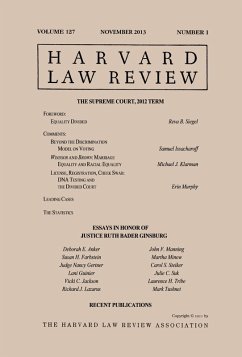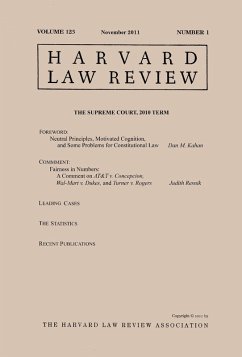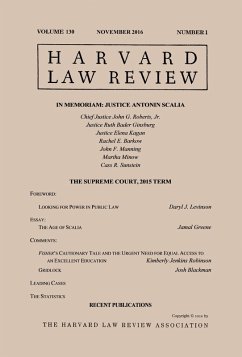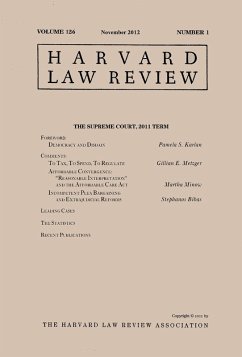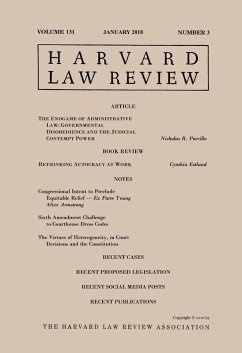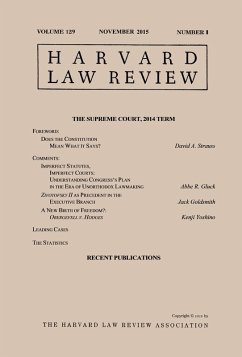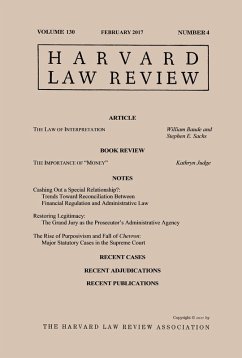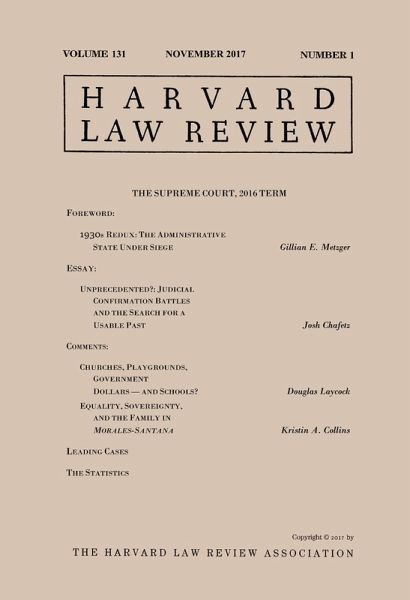
Harvard Law Review: Volume 131, Number 1 - November 2017 (eBook, ePUB)

PAYBACK Punkte
0 °P sammeln!
The November issue is the special annual review of the U.S. Supreme Court's previous Term. Each year, the Supreme Court issue is introduced by noteworthy and extensive contributions from recognized scholars. In this issue, for the 2016 Term, articles include: * Foreword: "1930s Redux: The Administrative State Under Siege," by Gillian E. Metzger * Essay: "Unprecedented? Judicial Confirmation Battles and the Search for a Usable Past," by Josh Chafetz * Comment: "Churches, Playgrounds, Government Dollars -- and Schools?," by Douglas Laycock * Comment: "Equality, Sovereignty, and the Family in Mor...
The November issue is the special annual review of the U.S. Supreme Court's previous Term. Each year, the Supreme Court issue is introduced by noteworthy and extensive contributions from recognized scholars. In this issue, for the 2016 Term, articles include: * Foreword: "1930s Redux: The Administrative State Under Siege," by Gillian E. Metzger * Essay: "Unprecedented? Judicial Confirmation Battles and the Search for a Usable Past," by Josh Chafetz * Comment: "Churches, Playgrounds, Government Dollars -- and Schools?," by Douglas Laycock * Comment: "Equality, Sovereignty, and the Family in Morales-Santana," by Kristin A. Collins In addition, the first issue of each new volume provides an extensive summary of the important cases of the previous Supreme Court docket, covering a wide range of legal, political, and constitutional subjects. Student commentary is thus provided on eighteen of the Leading Cases of the 2016 Term, including such subjects as racial gerrymandering, freedom of speech, regulatory takings, right to effective counsel, equal protection, appellate jurisdiction, fair housing, immigration law, insider trading, venue in patent cases, and remedies for constitutional violations. Complete statistical graphs and tables of the Court's actions and results during the Term are included; these summaries and statistics, including voting patterns of individual Justices, have long been considered very useful to scholars of the Court in law and political science. Finally, the issue includes a linked Index of Cases and citations for the discussed opinions. The Harvard Law Review is offered in a quality digital edition, featuring active Contents, linked footnotes, active URLs, legible tables, and proper ebook and Bluebook formatting. This current issue of the Review is November 2017, the first issue of academic year 2017-2018 (Volume 131). The Review is a student-run organization whose primary purpose is to publish a journal of legal scholarship. It comes out monthly from November through June and has roughly 2500 pages per volume. Student editors make all editorial and organizational decisions.
Dieser Download kann aus rechtlichen Gründen nur mit Rechnungsadresse in A, B, CY, CZ, D, DK, EW, E, FIN, F, GR, H, IRL, I, LT, L, LR, M, NL, PL, P, R, S, SLO, SK ausgeliefert werden.




